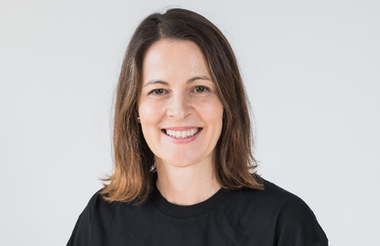Movember has been increasing its work on men's mental health in recent years, after early success fundraising and raising awareness of prostate and testicular cancer.
Now its chief executive, Michelle Terry, wants to use the charity’s global reach to have even more impact in tackling men’s mental and physical health.
Terry has led Movember for around three years, though the charity itself was set up in Australia in 2003.
“It was two gentlemen in a pub in Melbourne, musing about the fact that the moustache had gone out of fashion, and maybe they should bring it back and bring it back for a good cause. So essentially, they started off with a challenge in the month of November, now known as Movember, to 30 mates who were growing a mo.”
They realised “we’ve got a movement here” and really admired the work that had been happening in breast cancer, so decided to do something for men “because nobody seemed to be talking about them”.
‘We went global quite quickly, because we knew we had something’
The pair went to the Prostate Cancer Foundation of Australia, and then started raising money for the disease around the world.
“We went global quite quickly, because we knew we had something here in terms of raising awareness for men's health that helped them talk to other men and talk to people in their lives about what they were going through, whether it was a mental health problem or a physical health problem.”
Movember has “evolved since then”, Terry says, and raised over £600m for prostate cancer and testicular cancer. Its three areas of focus are prostate cancer, testicular cancer and men's mental health.
Terry trained as a psychologist, and became driven by a desire to integrate mental health support and the corporate world.
“I'm helping to bring that together, to bring that lens to grow Movember, and think about how we can help more men around the world.
“We are very lucky to be international in scope and scale. We operate in, raise funds, and also deploy funds in 20 countries around the world. We're very strong in a few countries, those being the UK, Ireland, New Zealand, Australia, the US and Canada.”
Covid-19: ‘We felt that that was our moment’
Men’s mental health has been a big focus for the charity in recent years, and coronavirus spurred this on.
“I remember us being acutely aware back in 2020 in particular, about our role and the necessity for leaning in and thinking about how we can really serve the community out there of men who are really suffering from isolation, lack of social support, etc, in the mental health arena.”
She says the pandemic also had a large impact on other areas of Movember’s work: “The lack of access to health systems meant that we were going to have a backup of problems in terms of cancer treatment.
“We put together some digital tools and tips. We reached out to the community of men that we serve, to make sure that we were really leaning in because it obviously was a time of crisis for a lot of people. So, we felt that that was our moment – we really needed to be there for the men that we were looking after, and we were trying to reach.”
Terry had expected donations to drop during the pandemic, but she was “amazed” to find that Movember’s fundraising was resilient.
“We actually had a very strong year in 2020 and 2021. I think people really responded to the call we were putting out there to the community to say ‘men are in crisis – we have men really suffering in their mental health, we have problems in terms of physical health – let's get out there and support them’. We were amazingly humbled by the support of the community at that time.”
Continued focus on mental and physical illness
Movember aims to evolve further, with a particular focus on cancer care.
“We’d like to build on the legacy that we have built in terms of prostate and testicular cancer. So, we've managed to work with a lot of other people to galvanise real world evidence, and build biomedical treatments and tests that have improved the mortality rate and survival rate of people who've been diagnosed [with cancer]. We're very proud of that. We want to continue to drive that into clinical practice.”
But Terry also says the charity aims to increase its focus on mental health.
“I think all of us realise mental health is an increasing issue and burden in our society, and we want to be the people who are really talking to men, and thinking about the preventative level.”
Terry suggests “one of the slight silver linings of Covid is that people are more aware of mental health”.
“In general, they're more willing to have that conversation and are more acutely aware of the preventative factors or the risk factors of mental health.”
But she says “that doesn't mean that we're anywhere near solving these problems” as “these are complex problems that require intersection between behavioural change, systems change and norms change”.
“When we think about gender norms, they quite often hold the problem in place. So, men are taught that it's not okay to talk about their feelings, or they need to be stoic, etc. We need to think about intergenerationally how we can change those norms to allow men to be the version of themselves that makes sense for them, but also allows them to express themselves and think about healthy behaviours.”
What Movember does in the other 11 months of the year
In the run up to Movember, which takes place this month, Terry says the charity spends “a lot of time” thinking about how to reengage long-term supporters, “but also think about how we engage new people”.
Movember’s most famous annual campaign involves fundraisers growing a moustache during November, but Terry says the charity offers other challenges.
She says some people may wish to run, walk or cycle 60 kilometres or above, to mark the 60 men every hour who take their own lives.
Recently the Duchess of Cambridge launched the Rugby League World Cup mental fitness match, which Movember sponsored alongside the overall tournament.
“We had a moment at the beginning of that, which was a minute of non-silence. And the non-silence was people making a lot of noise and stress around the idea that one man every minute takes his own life.”
Terry says the charity is active throughout the year, running programmes, working on biomedical research and creating networks of clinicians to improve outcomes for tests and treatments for cancer.
“Every day of the year, if it's November or not, we're out there advocating for men's health,” she says.
“Clearly, we raise a lot of funds and awareness in the month of Movember, and we're very proud of that, but we do keep on going for the rest of the year. We engage our community and we're also out there impacting the men through programmes.”
Movember turns 20 next year “which is a big milestone” and Terry says: “What I really hope is that we continue to raise our profile, and we continue to have a real impact on the ground.”
Terry says men's health “is a wickedly complex problem” and the charity plans to be “much more successful in creating and changing the world we want to see if we partner with others”.
“The more we can work with partners, and think about what's the problem we're seeking to solve, and how we can create collective impact, the better it's going to be.”
Related Articles
Annwen Jones: ‘I did feel in that worst case scenario the charity would not survive’
The co-founder and chief executive of Target Ovarian Cancer speaks about the impact of the pandemic and cost-of-living crisis on the charity, the importance of campaigning and the health inequity women experience.
Chris Askew: ‘We are deeply interested in and energised around tackling inequalities’
Diabetes UK’s CEO speaks about the charity's focus on tackling inequalities in diabetes care, the Covid-19 pandemic, the cost of living crisis, and opportunities for collaboration
Farah Nazeer: ‘Charities need the courage of their convictions to speak out’
Farah Nazeer, chief executive at Women's Aid, speaks to Harriet Whitehead about how the charity is campaigning to challenge misogynistic culture and end domestic abuse












